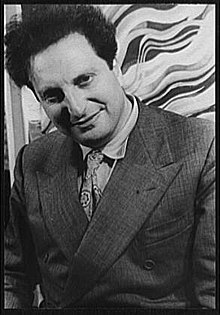Christ only came to Eboli
Christ only came to Eboli ( Italian Cristo si è fermato a Eboli ) is an autobiographical novel by Carlo Levi about the time of his exile (1935/1936) to Grassano and Aliano in the southern Italian region of Lucania (1932 to 1947 the official name of the Basilicata region ).
Personal experiences
The book, which came out in 1945 and in which he refers to Aliano by the invented name Gagliano , describes the situation in a place where the inhabitants have given up because everyone who dares to do something leaves the place to get something out of their lives close. “We are not Christians” they say, “Christ only came as far as Eboli .” In their expression, Christ means man; [...] "we are not considered human, but animals, [...] because we have to submit to the world of Christians beyond our horizon."
As an architectural contrast to the backwardness of the place, in the middle of a small square there is a roofed-over urinal, almost as high as a house, made of reinforced concrete for four people, similar to the ones built in large cities in previous years. However, it is only visited by pigs to drink and children to play. On the wall is the inscription of a Turin company. Levi, who was from Turin, writes: One person often used it for the purpose for which it was built, and that was me; and in doing so, as I must admit, I was driven not by a need, but only by homesickness.
While he tries to evade the dignitaries of the place, on whom he is dependent (rigidly defined space for movement, going out times and letter censorship) and who try to draw him into their generation-old battles, he finds peace in the heat of the "Malarialand" in the cemetery a new grave dug as a precaution. In this loneliness and freedom I spent whole hours.
Historical image
Levi sees the world of the peasant as unchanged since pre-Roman times . The historical sense that penetrated this world with Aeneas is alien to them. And even before Fernand Braudel from the Annales School wrote his history of the Mediterranean from the perspective of the longue durée , he formulated: I thought we should write a story of this Italy if it is possible to write a story of something that does not take place in time: the only story of that which is eternal and unchangeable ; a mythology .
Political implications
In his opinion, friends, whom he told about his experiences during a short stay in his home country, take the problem of the south too abstractly. The world of the peasants seems to him incompatible with a state that does not grant the individual communes much more autonomy. As long as this is not created, he sees the world of the peasants sunk in constant resignation, only occasionally interrupted by desperate uprisings - such as those of the brigands in the second half of the 19th century. It cannot be the state that solves the problems of the south, I said, for the simple reason that what we call the problem of the south is nothing more than the problem of the state itself.
Movie
Francesco Rosi made a film of the same name that was released in 1979. Gian Maria Volonté can be seen in the leading role of Carlo Levi .
Bibliographical information
- Christ only came to Eboli. Translated by Helly Hohenemser-Steglich. Europa Verlag, Zurich / Vienna / New York 1947; 4th edition 1973.
- Christ only came to Eboli. Translated by Helly Hohenemser-Steglich. dtv, Munich 2003, ISBN 3-423-13039-3 .
